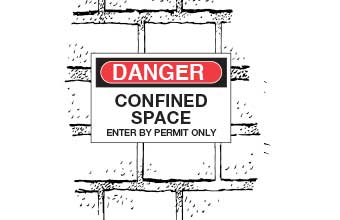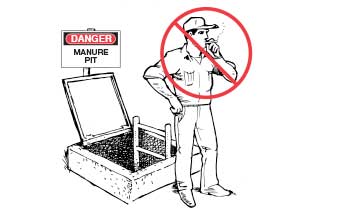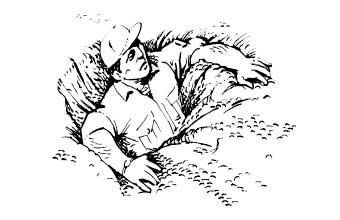Know the Dangers of Confined Spaces
Here are some key points.
- Confined spaces are very dangerous.
- Only people with specialized training should enter confined spaces.
- Obey all signs warning you to stay out of such confined spaces as silos, grain bins and manure pits.
- Never let anyone talk you into entering a confined space.
What is a confined space?
- You may have heard the term “confined space” but were uncertain exactly what it means.
- A confined space is defined as an area that:
- is large enough for a person to occupy
- is difficult to get in and out of
- is designed for only short-term work
- Confined spaces can be found in many places on an agricultural or horticultural operation.
- Some examples of confined spaces that you may be familiar with are:
- silos
- grain bins
- manure pits
- well shafts
- deep trenches
- agricultural chemical tanks
- cold storage rooms
- hopper rail cars
- tank trucks

Only people with specialized training should enter a confined space.

The buildup of these gases can be easily ignited, causing a fire or an explosion. That’s why it’s very important not to smoke around a confined space.

Confined spaces have many physical hazards. These include falling objects, loose material that can break under your weight and engulf you, wet surfaces, and sloping or otherwise dangerous sides.
Confined spaces are very dangerous
- Only people with specialized training should enter a confined space.
- These spaces should be marked with “Danger” signs or signs with similar wording warning you to keep out.
- This is how we warn you about the confined spaces here.
Why confined spaces are dangerous
- Confined spaces have many potential hazards.
- Here are some examples:
- Certain gases such as methane may be produced in confined spaces. Many gases displace oxygen in the air you need to breathe.
- Cold storage rooms often have the oxygen pumped out of them to help preserve foods.
- Gases such as carbon monoxide, methane and hydrogen sulfide may build up to toxic levels in confined spaces. Some of these gases are odorless, so you won’t even know they are there.
- The buildup of these gases can be easily ignited, causing a fire or an explosion. That’s why it’s very important not to smoke around a confined space.
- Confined spaces have many physical hazards. These include falling objects, loose material that can break under your weight and engulf you, wet surfaces, and sloping or otherwise dangerous sides.
- Temperatures inside confined spaces may be very hot or very cold.
Safety around confined spaces
- If you see a confined space that isn’t marked with a warning sign, let your supervisor know.
- Immediately tell your supervisor if you spot an uncovered confined space where there might be a danger of falling in.
- Always work in pairs around a confined space.
- Stay away from confined spaces if you are smoking or are using electrical equipment that could cause sparks.
- If someone inside a confined space appears to be in trouble, don’t go in after that person. Instead, get help from someone who has been specially trained to enter a confined space.
Confined Spaces Do’s and Don’ts
Do
- Obey all warning signs to keep out of confined spaces.
- Stay out of silos and other potentially dangerous areas.
- Get help from a specially trained person if you think someone is in trouble inside a confined space.
- Ever enter a confined space unless you have been authorized and have received special training.
- Smoke around a confined space.
- Let a co-worker talk you into entering a confined space.
Safety Supplies
When you’re ready to work safely, you’re ready to work. See our full line of safety supplies, including respirators, eye and ear protection, coveralls, first aid and more.







